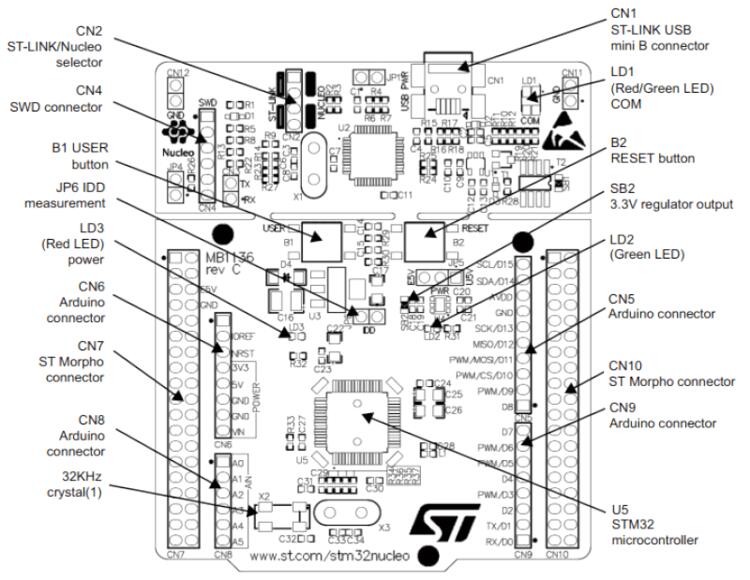Nucleo F302R8
Overview
The Nucleo F302R8 board features an ARM Cortex-M4 based STM32F302R8 mixed-signal MCU with FPU and DSP instructions capable of running at 72 MHz. Here are some highlights of the Nucleo F302R8 board:
STM32 microcontroller in LQFP64 package
LSE crystal: 32.768 kHz crystal oscillator
Two types of extension resources:
Arduino* Uno V3 connectors
ST morpho extension pin headers for full access to all STM32 I/Os
On-board ST-LINK/V2-1 debugger/programmer with SWD connector
Flexible board power supply:
5 V from ST-LINK/V2-1 USB VBUS
External power sources: 3.3 V and 7 - 12 V on ST Zio or ST morpho connectors, 5 V on ST morpho connector
One user LED
Two push-buttons: USER and RESET
More information about the board can be found at the Nucleo F302R8 website, and in the STM32 Nucleo-64 board User Manual.
Hardware
The Nucleo F302R8 provides the following hardware components:
STM32F302R8T6 in QFP64 package
ARM® 32-bit Cortex® -M4 CPU with FPU
72 MHz max CPU frequency
VDD from 2.0 V to 3.6 V
64 KB Flash
16 KB SRAM
RTC
Advanced-control Timer
General Purpose Timers (4)
Basic Timer
Watchdog Timers (2)
PWM channels (18)
SPI/I2S (2)
I2C (3)
USART/UART (3/3)
USB 2.0 FS with on-chip PHY
CAN (2)
GPIO with external interrupt capability
DMA channels (7)
Capacitive sensing channels (18)
12-bit ADC with 15 channels
12-bit D/A converter
Analog comparator (3)
Op amp
More information about the STM32F302R8 can be found here:
Supported Features
The Zephyr nucleo_f302r8 board configuration supports the following hardware features:
Interface |
Controller |
Driver/Component |
|---|---|---|
NVIC |
on-chip |
nested vector interrupt controller |
UART |
on-chip |
serial port-polling; serial port-interrupt |
PINMUX |
on-chip |
pinmux |
GPIO |
on-chip |
gpio |
PWM |
on-chip |
pwm |
I2C |
on-chip |
i2c |
SPI |
on-chip |
spi |
ADC |
on-chip |
ADC Controller |
Other hardware features are not yet supported on this Zephyr port.
The default configuration can be found in boards/st/nucleo_f302r8/nucleo_f302r8_defconfig
Connections and IOs
The Nucleo F302R8 Board has 5 GPIO controllers. These controllers are responsible for pin muxing, input/output, pull-up, etc.
Board connectors:

Default Zephyr Peripheral Mapping:
The Nucleo F302R8 board features an Arduino Uno V3 connector and a ST morpho connector. Board is configured as follows:
UART_2 TX/RX : PA2/PA3 (ST-Link Virtual Port Com)
UART_3 TX/RX : PC10/PC11
I2C1 SCL/SDA : PB8/PB9 (Arduino I2C)
SPI2 CS/SCK/MISO/MOSI : PB6/PB13/PB14/P15 (Arduino SPI)
PWM_2_CH2 : PA0
USER_PB : PC13
LD2 : PB13
System Clock
The Nucleo F302R8 System Clock can be driven by an internal or external oscillator, as well as by the main PLL clock. By default the System Clock is driven by the PLL clock at 72 MHz. The input to the PLL is an 8 MHz external clock supplied by the processor of the on-board ST-LINK/V2-1 debugger/programmer.
Serial Port
The Nucleo F302R8 board has 3 UARTs. The Zephyr console output is assigned to UART2. Default settings are 115200 8N1.
Programming and Debugging
The Nucleo F302R8 board includes an ST-LINK/V2-1 embedded debug tool interface.
Flashing
The board is configured to be flashed using west STM32CubeProgrammer runner, so its installation is required.
Alternatively, OpenOCD or JLink can also be used to flash the board using
the --runner (or -r) option:
$ west flash --runner openocd
$ west flash --runner jlink